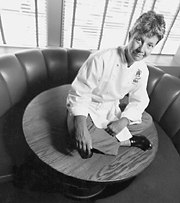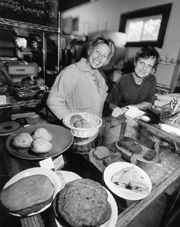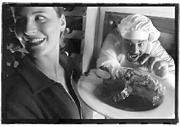The best-kept restaurant secret in Seattle right now has got to be Salumi, a nondescript wide-spot-in-the-wall down by the Kingdome run by one of the most passionate foodies in this city. When you walk in that’ll be him, Armandino Batali, behind the deli case, describing to some fawning devotee the difference between the fennel sausage and the special spicy sausage; Batali cures them himself, along with the coppa and salami and prosciutto. He’ll likely lop off a steaming chunk of both and let the customer try for herself.
Salumi 309 Third S, 621-8772 Mon-Fri 11am-2pm, takeout 4-6pm, dinner Sat nights for parties of 10 by reservation only AE, MC, V; beer and wine
Then he’ll slice the chosen meat and lay the pieces inside a crusty baguette, slathered with an anchovy-rich pesto sauce and garlic sauce, and suggest a side of chard or Roman beans or dandelion greens or whatever else is fresh and garlicky that day. You’ll add a Pellegrino water to the tab, which won’t top $10 (or probably even $8), and sit with other happy lunchers at the single long table, and wonder how long it’s been since you’ve enjoyed a sausage this much.
This is Armandino Batali’s world, and the world of his family, generations back. The unlikely location (between the Iron Horse Restaurant and the junkies on the Third Avenue Extension) reflects this: In 1903 Batali’s grandfather, Angelo Merlino, opened Seattle’s first Italian import store, Metropolitan Grocery, just around the corner. That’s where Batali’s dad Armando was working when a young Abruzzese immigrant named Leonetta came in to sell cheese from her family’s farm in Yakima. In time Armando and Leonetta forged a union of their own, moving back to the Yakima farm to raise their three kids. Armandino was the youngest.
Flash forward to 1996, and Armandino—now married with three kids himself—is ready retire from 31 years of service at Boeing. At last it was time to realize the dream he and his wife Marilyn had been cooking up since Boeing had moved them to Europe: “to preserve the flavors and traditions of the past,” as he writes on Salumi’s brochure, “while promoting the synergism of food, conversation, and friendship.”
Batali threw himself into the project, practicing the recipes he’d grown up enjoying around the family table (many left in his mother’s own hand), enrolling in a New York culinary program, working at the Alps gourmet salami factory in Queens for a summer, even apprenticing with two Italian butchers as they traveled through the Tuscan countryside butchering and preserving pigs and lambs. The techniques he learned—ancient methods Italians have been using to cure meats and make sausages for generations—are the techniques Batali now employs in the back room of his funny little restaurant on Third Avenue South. That back room is gaining quite a following: Folks pop in for sausage and meatball sandwiches at lunchtime, but at least as many are making special trips to purchase Batali’s freshly cured pork and lamb products in bulk to cook at home.
It’s a far, far smaller number of the very lucky or very patient who get to come in as dusk falls on a Saturday night, making their way through the junkies and the baseball fans to gather around the long country table in back and let Armandino Batali show them, for one glorious evening, how food was meant to be eaten.
“Welcome to Salumi!” Batali announced as the last of our guests had taken their place around the table, raising his champagne flute as a toast. Celebration it was indeed—if only for the fact that we’d been waiting seven months for this table. Offering dinner for just one party of 10, just one night a week, Salumi makes The Herb Farm look like a drive-thru. (Batali’s Saturday nights are currently booked through December; he’ll be taking reservations for 2000 beginning in mid-September.)
Along with the sparkling wine, Batali and his affable waiter Tony Longo offered around bruschetta, glistening with mouth-filling imported olive oil and topped with shrimp, onions, enoki mushrooms, and pungent lime leaves. “We believe in depth of flavor,” Batali told us, and that much was clear. The flavors of the bruschetta, bright with garlic and citrus, were solid and bold.
With them we nibbled from a sampler platter of Batali’s cured meats: salami, beef tongue, pork prosciutto, lamb prosciutto, and finnochionna (Tuscan-style fennel salami), sliced transparently thin and robustly flavored. All this we enjoyed on our feet, cocktail-party style, perching our champagne glasses on any available surface and noshing democratically across the group.
Batali, meanwhile, was guiding a few of us at a time up to the pasta-making station in the window. One of the myriad things that sets Salumi apart from the run of Italian restaurants in Seattle is the fact that guests participate in the cooking. Tonight it would be pinci, a chewy eggless pasta we rolled into long, skinny rods like cylindrical fettucine under floured fingers. Once we’d all had our chance, Batali whisked our project away and turned it into a steaming plate of fragrant pasta, decorated with sweet tomatoes, basil leaves, and aromatic pecorino romano. This dish was simple and delectable, and highly eatable.
At some point—with the quickest-draw wine refills in the West it was all beginning to grow a little fuzzy—Longo popped the Pinot Grigio and Batali produced the gnocchi, prepared in classic Northern Italian fashion. Many of us agreed that this dish represented the acquired taste of the evening, the sage not quite matching the buttery cinnamon for intensity and the whole coming off to the unfamiliar palate—not unpleasantly, mind you—a lot like cinnamon toast. The plump potato dumplings were perfect.
So, nearly, was the crescendo of the evening: a mixed grill of sausages, lamb, and an impossibly tender little delicacy called pork cheeks, beautifully arranged on the plate with grilled peppers and a lovely, charry fennel bulb. This showcase for Batali’s art was delicious, featuring spicy sausage, and marred only by a tough piece of lamb.
Salads arrived next: simple m鬡nges of young lettuces topped with tomatoes and onions and subtly dressed in a mustard sauce. Next came the other audience-participation food of the evening. Before the mixed grill, Batali had plopped a hunk of raw mozzarella onto the table and bid us to don surgical gloves and massage it, under hot water, into the gluey consistency of cheese. Our results now appeared on individual plates, surrounded majestically with regional and tropical fruits. Wonderful! We finished with anisy bars of unscotti—like biscotti, only baked just once to preserve softness—to dip into glasses of Vin Santo. After relaxing a bit over coffee, we dispersed into the August night, fat and happy and feeling quite inexplicably rich.
Which had nothing whatever to do, of course, with the wad of cash we had so handily just dropped. Truth be told, the whole tab (wine, tax, and tip included) totaled not quite $80 a person—an unbelievable bargain for a meal of such breadth and sumptuous liquid accompaniment. (A quibble: We had left wine choices in Batali’s hands, and he chose beautifully, but poured copiously. We left with the distinct impression that they had to sell a lot of wine to make up for the bargain $37-a-head price of the eight-course feast. With its growing reputation, Salumi could easily raise the price of the dinner to where it belongs and stop pushing the wine.)
Our only other quibble concerns Batali’s manner. He is a skilled artisan, a culinary craftsman, and extraordinary at what he does in his back room. He is therefore increasingly busy. The day I met with him to discuss the menu for our dinner—an appointment he makes with every dinner host about a week before the event—he was also talking to a local food writer and trying to fulfill the formidable sausage needs of a couple of the aforementioned fawning devotees. That I was given the bum’s rush is perhaps understandable under the circumstances, but not excusable for a fellow in the hospitality business.
Perhaps Batali knows his deficits in this area, for at dinner he amply made up for them. He was jolly and joshing, handing out awards for the best pinci roller. And when a guy walked in off the street and began to sing us heartbreakingly, glass-breakingly beautiful arias—he’s a friend of Batali’s from the Seattle Opera—all was forgiven.
Mostly Batali poured himself into every aspect of our dinner. Salumi is his life, his postretirement labor of love, the way he celebrates the legacy of his family. And the legacy continues: Armandino and Marilyn’s eldest son is a celebrated New York City chef. In addition to hosting his own cooking show, Molto Mario, Mario Batali runs the restaurants Po and Babbo, the latter of which just won the staggeringly prestigious James Beard Award for best new restaurant in the country.







